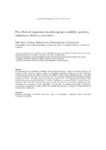Mostrar o rexistro simple do ítem
The effects of expectancy on corticospinal excitability: passively preparing to observe a movement
| dc.contributor.author | Arias, Pablo | |
| dc.contributor.author | Robles-García, Verónica | |
| dc.contributor.author | Espinosa, Nelson | |
| dc.contributor.author | Corral Bergantiños, Yoanna | |
| dc.contributor.author | Mordillo-Mateos, Laura | |
| dc.contributor.author | Grieve, Kenneth | |
| dc.contributor.author | Oliviero, Antonio | |
| dc.contributor.author | Cudeiro, Javier | |
| dc.date.accessioned | 2018-04-06T10:35:10Z | |
| dc.date.available | 2018-04-06T10:35:10Z | |
| dc.date.issued | 2014-01-08 | |
| dc.identifier.citation | Arias P, Robles-García V, Espinosa N, et al. The effects of expectancy on corticospinal excitability: passively preparing to observe a movement. J Neurophysiol. 2014;111:1479-1486 | es_ES |
| dc.identifier.issn | 0022-3077 | |
| dc.identifier.issn | 1522-1598 | |
| dc.identifier.uri | http://hdl.handle.net/2183/20388 | |
| dc.description.abstract | [Abstract] The corticospinal tract excitability is modulated when preparing movements. Earlier to movement execution, the excitability of the spinal cord increases waiting for supraspinal commands to release the movement. Movement execution and movement observation share processes within the motor system, although movement observation research has focused on processes later to movement onset. We used single and paired pulse transcranial magnetic stimulation on M1 (n = 12), and electrical cervicomedullary stimulation (n = 7), to understand the modulation of the corticospinal system during the “preparation” to observe a third person's movement. Subjects passively observed a hand that would remain still or make an index finger extension. The observer's corticospinal excitability rose when “expecting to see a movement” vs. when “expecting to see a still hand.” The modulation took origin at a spinal level and not at the corticocortical networks explored. We conclude that expectancy of seeing movements increases the excitability of the spinal cord. | es_ES |
| dc.description.sponsorship | This work was supported by Xunta de Galicia (Conselleria de Educación-2007/000140-0 and Dirección Xeral de I+D+i; 2010–2012), Spain. V. Robles-García and Y. Corral-Bergantiños received grants from the FPU-MECD AP2010-2774 and AP2010-2775 Spain. | es_ES |
| dc.description.sponsorship | Xunta de Galicia; 2007/000140-0 | |
| dc.description.sponsorship | info:eu-repo/grantAgreement/MECD/Programa Nacional de Formación/AP2010-2774/ES | |
| dc.description.sponsorship | info:eu-repo/grantAgreement/MECD/Programa Estatal de Promoción del Talento y su Empleabilidad/AP2010-2775/ES | |
| dc.language.iso | eng | es_ES |
| dc.publisher | American Physiological Society | es_ES |
| dc.relation.uri | http://dx.doi.org/10.1152/jn.00353.2013 | es_ES |
| dc.subject | Movement preparation | es_ES |
| dc.subject | Movement observation | es_ES |
| dc.subject | TMS | es_ES |
| dc.subject | Cervicomedulary stimulation | es_ES |
| dc.subject | Spinal excitability | es_ES |
| dc.subject | Coticospinal excitability | es_ES |
| dc.title | The effects of expectancy on corticospinal excitability: passively preparing to observe a movement | es_ES |
| dc.type | info:eu-repo/semantics/article | es_ES |
| dc.rights.access | info:eu-repo/semantics/openAccess | es_ES |
| UDC.journalTitle | Journal of Neurophysiology | es_ES |
| UDC.issue | 111 | es_ES |
| UDC.startPage | 1479 | es_ES |
| UDC.endPage | 1486 | es_ES |
Ficheiros no ítem
Este ítem aparece na(s) seguinte(s) colección(s)
-
GI-NEURO - Artigos [158]
-
INIBIC-NEURO - Artigos [48]






